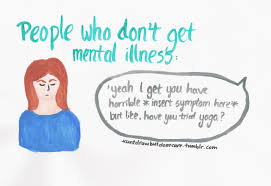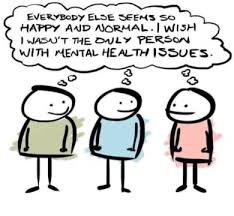There’s a stigma surrounding the idea of therapy. People hesitate to use say the word or to admit that they are in or are even considering therapy. Therapy tends to be a closely guarded secret. And that could be because mental health is a medical condition and one’s medical information tends to be private information. However, I think it’s more than just an issue of privacy. When people talk about therapy, it’s in hushed tones – almost as if it were something shameful.
As an outsider to the world of therapy and mental health treatment, my word on this matter means nothing. But even as an outsider, I am able to notice how people in the “therapy world” and those people outside of it seem to skirt around the issue. Those in therapy don’t want to admit that they are in therapy. And those not in therapy don’t want to admit that therapy exists.
 Those in therapy either speak about their experience quietly and almost shamefully or not at all. Society seems to promote and maintain the misconception that therapy is for the weak minded, weak-willed, and/or the “crazies”. When such a misconception exists, no one is willing to admit they are in therapy nor will anyone who may benefit from it go into therapy. This misconception undervalues a valuable resource and it shuts down open conversation about it. It’s almost like a cycle. If those with this experience speak out about their first-hand accounts, they could change society’s mindset about therapy. However, with the stigma around the very word “therapy”, their voice is wrenched away from them and they are left feeling powerless to cause change. People are afraid of admitting they are in therapy because they are afraid that others will use that as a way to define and judge their characters. And with this uncalled for judgement passed upon them, their work lives, school lives, and personal lives may become affected. It’s hard to change a stigma when you are unable to openly communicate about it.
Those in therapy either speak about their experience quietly and almost shamefully or not at all. Society seems to promote and maintain the misconception that therapy is for the weak minded, weak-willed, and/or the “crazies”. When such a misconception exists, no one is willing to admit they are in therapy nor will anyone who may benefit from it go into therapy. This misconception undervalues a valuable resource and it shuts down open conversation about it. It’s almost like a cycle. If those with this experience speak out about their first-hand accounts, they could change society’s mindset about therapy. However, with the stigma around the very word “therapy”, their voice is wrenched away from them and they are left feeling powerless to cause change. People are afraid of admitting they are in therapy because they are afraid that others will use that as a way to define and judge their characters. And with this uncalled for judgement passed upon them, their work lives, school lives, and personal lives may become affected. It’s hard to change a stigma when you are unable to openly communicate about it.
Those not in therapy somehow feign ignorance on the matter. They shut down at the mention of therapy. If another person mentions being in therapy, suddenly an awkward silence and tensions develop. They become uncomfortable with the conversation and try to steer it elsewhere. And this could be in part because they believe that such issues are supposed to be private matters and that they are suddenly intruding on that other person’s personal life. It could be because they have never been in this type of conversation before – they aren’t prepared to handle such topics and they’ve never been exposed to the idea and benefits of therapy, just the misconception and stigma of therapy. (This really stresses the importance of open and free communication and early exposure to the mental health world. Even if it is not a firsthand experience, everyone should have some experience with mental health.) But, I think part of the awkward tension is because they don’t want to admit that therapy could be an option for them. Because in their minds, admitting that they could benefit from therapy means admitting that there is something wrong with them and that it needs to remedied. When therapy is misconstrued as being for those who are weak willed, weak minded, and just all around wrong, then admitting that you need or are interested in therapy means that you are weak willed, weak minded, and wrong. And no one wants to admit that.
Th e sad part of all this is that these thoughts, actions, and reactions of those in and out of therapy are based on a misconception. Therapy does not and will never equate to weak. Through perspective and communication, this misconception could be broken and the whole mental health field could be changed. We are influenced and chained down by wrong ideas and perspectives – and that is a very frustrating and sad revelation. It’s like the circus elephant. They are obviously stronger than the rope that holds them, but they don’t think that; they don’t know that because from a young age they were bound by a rope and they grew up with the belief and misconception that that rope was stronger than them. We grow up with the belief and misconception that therapy and the mental health field as a whole is shameful and weak. Circus elephants live their whole lives bound by a rope – we don’t have to.
e sad part of all this is that these thoughts, actions, and reactions of those in and out of therapy are based on a misconception. Therapy does not and will never equate to weak. Through perspective and communication, this misconception could be broken and the whole mental health field could be changed. We are influenced and chained down by wrong ideas and perspectives – and that is a very frustrating and sad revelation. It’s like the circus elephant. They are obviously stronger than the rope that holds them, but they don’t think that; they don’t know that because from a young age they were bound by a rope and they grew up with the belief and misconception that that rope was stronger than them. We grow up with the belief and misconception that therapy and the mental health field as a whole is shameful and weak. Circus elephants live their whole lives bound by a rope – we don’t have to.
By: Jana Badrani, Anxiety In Teens Contributor